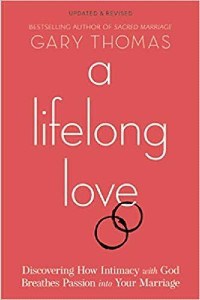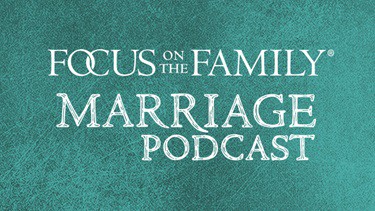Preview:
Gary Thomas: When I thought my greatest need was to be loved, a good day was when I was noticed, appreciated, cared for, and shown affection. Now, a good day, if I believe my greatest need is to learn how to love, is when I can notice, when I can show affection, when I can serve.
End of Preview
John Fuller: That’s Gary Thomas describing a profound change in perspective that really transformed his marriage, and today you’ll hear how God wants to do the same thing for you and your spouse. This is Focus on the Family with your host, Focus president and author, Jim Daly, and I’m John Fuller.
Jim Daly: John, when it comes right down to it, I think every husband and wife secretly wants the happily ever after part of marriage. Who doesn’t? Now, we don’t really believe in fairy tales but there’s this innate desire and longing, which I think is God given, that wishes for something better and more loving, and more intimate, with your spouse. Admittedly, it’s easy to get distracted by the busy-ness of life and we can put marriage and family on autopilot and cruise along, thinking everything’s okay, but as followers of Christ, we know that our marriages are meant to be a spiritual symbol of something much bigger and deeper than we can even imagine. In Ephesians chapter five, the Apostle, Paul, calls marriage a mystery, and compares it to the relationship Jesus Christ has with the church, so we really can’t afford to take our marriages for granted, and the good news is that, God does have something better, more loving, and more intimate in mind for you and your spouse, and we’re going to hear about that today from Gary Thomas.
John: Right, Gary was our guest at a special event just a few months back, where we interviewed him on the stage of our chapel before a live audience of about 40 couples who are friends of Focus on the Family, and our topic was Gary’s book, A Lifelong Love: Discovering How Intimacy with God Breathes Passion Into Your Marriage. Jim, here’s how you began the conversation with Gary Thomas on today’s episode of Focus on the Family.
Jim: Okay, you’ve written this wonderful book, A Lifelong Love, but I gotta get right to it. You admitted that when you first got married, you did it for all the wrong reasons. I think I know what that means, but you said it was all selfish.
Gary: It- it was. It was a shocking time of prayer for me when I was just asked, I believe by God, in prayer, “Why did you marry your wife?” And there were a lot of reasons for me to marry someone like Lisa. She had so many good qualities. I loved the way she looked. I thought she would be a great mom. I liked the way her mind though. Um, I knew she loved the Lord, and I was like, “Well, she’s this, this, and this-”
Jim: You know, you should’ve started with that one.
Gary: Yeah (laughs).
Jim: I’m just saying.
Gary: But- but it hit me that in many ways, I got married to Lisa because of everything that I thought she would bring to me. I thought I would have a better life, if I could get Lisa to marry me, or if I couldn’t get Lisa to marry me, then someone else. And while we all kind of make those decisions, it was just shocking to realize that it was selfishness that was moving me into marriage, when I believe that God designed marriage to pull us out of our selfishness.
Jim: Yeah. Uh, I think that’s pretty normal for most of us though. I think that’s how we start. You know, we notice somebody that we’re attracted to and then it moves from there.
Gary: Yeah.
Jim: You used a term in your book called, spider spouses.
Gary: Yes, yeah.
Jim: So, that sounds a little creepy.
Gary: Yeah, it is. It is.
Jim: What’s a spider spouse?
Gary: Think about how nefarious this is, the spider constructs this web for one purpose, to catch victims, and then eat them.
Jim: (laughs)
Gary: (laughs) I mean, that’s- that- that’s what it is.
Jim: And what’s the analogy to marriage? I’m sorry.
Gary: But- but in some ways we construct these webs, how can I look attractive? How can I do this? How can I get you to consider this? So that then, I can go and you can meet all my needs. And I can feed off you, feed off your affirmation, feed off your wealth, feed off sexual interests. I mean, there are a lot of different reasons that move people to get married, and that’s, it’s really a- a disgusting picture that, to show our selfishness for what it really is, and again, if God’s agenda in marriage is to pull us out of our selfishness, whatever led us into marriage, we have to realize, okay, if I wanna go God’s pathway into marriage, I’ve gotta stop being a spider spouse. I’ve gotta look at marriage from an entirely different angle, not to be a spider, but to see, be someone who blesses my spouse.
Jim: Yeah, that is so good. You- you go on to say in the book about 1 Corinthians 13, that, that’s the marriage passage. I think many of us know that passage, but what stands out in 1 Corinthians 13 for you?
Gary: Well, how so often when people come into me for counseling, they don’t realize how they are directly contradicting what Paul tells us to do in 1 Corinthians 13. Love doesn’t boast, and they boast about how they’re the better spouse. Love keeps no record of wrong, and the wife will say, “Do you realize when he was in college, he got fired from Taco Bell for this and he got kicked out of school for that,” and you got, okay, and if I would just read first Corinthians right there and they go, “Oops,” because they’re- they’re coming here with all the things that their spouse doesn’t do and I’m saying, “Well, yeah, that’s true, and you’re not doing anything that Paul describes as love in 1 Corinthians 13,” and that’s really what we look at marriage as, is that it’s not that one person is right or wrong, it’s how marriage helps both of us become more right, more loving, fulfilling, 1 Corinthians 13, ’cause I don’t think that most of us get married with the agenda that God has, and if I could just add on to when I got married selfishly, the other thing I think is so wrong when I got married, is I thought my greatest need was to be loved. I loved movies. I loved pop music. I loved novels. And every one of them were in agreement that, that was what was be fulfilling. I had to find that love. That was my greatest need. And I believe that God would’ve told me, “No, your need to be loved has been met perfectly in the person of Jesus. No one can love you more than I’ve loved you. I died for your sins. I’ve given you my spirit, who comforts you, who convicts you if you start to do those stupid things, makes you miserable so you turn around and come back. So, if- if you were in Christ, I don’t believe your greatest need is to be loved. Your greatest need is to learn how to love.
Jim: Boy, that’s a big paradigm shift.
Gary: Oh, it was months for me. It was like, when this is God dropped in and I really struggled with it for months, but then I- I put in the scripture, I don’t want people to just take my experience. There are so many versus that say, love extravagantly. Love you have, the love you have for everyone should be increasing. Love even your enemies. There isn’t a single verse that says, “To be fulfilled, find a romantic partner who will love you like you’ve never been loved before.”
Jim: (laughs)
Gary: So, I- I think the silence of scripture is very loud and the overwhelming witness of scripture is, you need to learn how to love. I didn’t get married for that reason, but I believe God wanted me to get married for that reason, and I grew in my appreciation and satisfaction in marriage when my agenda began to align with God’s, rather than trying to get God to give me what I thought I needed out of marriage.
Jim: Well, and again, with that paradigm shift, uh, you also talk about a Monk’s marriage.
Gary: Yeah.
Jim: Now, I didn’t know Monks could be married.
John: That’s a big paradigm shift.
Jim: Yeah, that is a paradigm shift. Uh, so first of all, I need that definition. What did you mean by following monks marriage?
Gary: Well, if it’s a little bit of a creative thing, but I go off Psalm 146 that says, “Do not put your trust in princes, in human beings who cannot save.” So let’s go back 3,000 years when that Psalm was written. It doesn’t sound that shocking to us now because kings are sort of figure heads. Back then, kings had unrivaled, unquestioned authority. If they said, you’re poor, you’re gonna be poor. If they said, I want your wife, they got your wife. If they said, you’re gonna die, you died. If you go to prison. That- they- they did everything. And so, when the Psalm says, “Don’t put your trust in a king that you can see. Put your trust in God who you can’t, it was a shocking thing because everything within you would say, I have to have favor with the king because he can determine my life on earth, and the Psalm was to say, “No,” because in the end, he doesn’t determine you- your destiny. You have to trust in the God who you can’t see. So, let’s apply this to marriage. We put our hope in a spouse who we can see, not in a God we can’t see. How I tied it in with the monk, it may be the weird way my mind works, but you guys know, I like to read the Christian classics. I would read these books of monks and nuns that had very satisfying lives because they were so in love with Jesus. And I thought, well, they’re happy, but they’re not having all of, they don’t expect a spouse to do this, or a spouse to notice this, or hear this, or provide this, or offer that, and yet, they’re so happy. So, what if I could have this monk’s attitude that I will find my fulfillment and joy and meaning and purpose and affirmation from God, and then everything my spouse gives me, is extra. It’s not an expectation. It’s find my satisfaction with God, and so then, instead of being frustrated I’m not getting this ’cause I want that, and that ’cause I want that, it’s like, I have this and I get your smile, too, or your kiss, too, or your “atta boy,” too. And- and ’cause it dawned on me so often, when we’re dating, we have this attitude, “Wow, you- you got me flowers, you got this present, you sent me a card,” and then the wife says after they’re married, “You got me flowers again? You got me a card that you didn’t even write?” I mean, the-
Jim: (laughs)
Gary: The thing that delights you as boyfriend or girlfriend, can frustrate you as a husband or wife, it’s all because of expectations. They’re, you don’t expect in dating that they have to do it, and now they’re a spouse, and you expect them to do it, so you lose the joy. So, it’s really this way of saying, “How do we recapture the joy in marriage, by saying married people should be just as dependent on God for their satisfaction, for their affirmation, for their hope, their joy, their peace, and then marriage is added onto it. Rather than, trying to draw the- the majority of our affirmations, satisfaction, joy, and peace from our spouse, and go to church once a week and remember that God loves us and forgives us.
Jim: Yeah, I think you’re saying some wonderful things here, and uh, I remember being criticized by s- in a book I wrote, about keeping your expectations low about people. That way, your disappointments are pretty rare, and that’s what I got criticized for. Daly’s best advice is keep your expectations low, but you’re saying the same thing I am, that in marriage, put your hope in God. Put your trust in God. Now, let me just play, you know, the opposite side of this. Um, it’s great. It sounds wonderful in theory to be that in love with God, that all your needs are met in your relationship with the Lord. Lisa’s sitting right here, have you been able to achieve that?
Gary: No (laughs)
Jim: Sorry, sorry.
Gary: Look, uh, here’s what ‘ve realized, and maybe this is why I write about it ’cause you see your own weaknesses. I often tell people, my marriage books are the stories of my failures and God trying to call me out of them. To be honest-
Jim: Which helps the rest of us, by the way, thank you.
Gary: And obviously, we have the same critics, because I recognize that voice, but I was reading The Philokalia, I don’t- I don’t know how you pronounce it. It’s this Eastern Orthodox group, like fourth, the 15th centuries, the great classical writings from the Eastern Orthodox church. I- I like to read out of the tradition and one of the things that- that keeps coming back if you read through that. I mean, it’s gigantic, so you usually read sections, but is, and I love it because the east looks at things differently than the west, this lust for praise that they insist cannot be satisfied.
Jim: Mm-hmm.
Gary: And the lust for praise is every bit as strong as the lust for more money, materialism. The lust for excitement, sexual lust, gluttony. What- what they’re saying is, you start to give into it, if you need it, it grows. It’s not satisfying. It demands more and more of you until it ruins you, and I never looked at my lust to be appreciated and desired and praised in that light as a sin and something dangerous, uh, until I was reading these great church fathers that- that mentioned how it was. I mean, I- I was a master. This was so prophetic, but one of Lisa’s love languages would be acts of cleaning. Very much more specific-
Jim: Acts of cleaning?
Gary: Yes.
Jim: I didn’t find it in Gary Chapman’s book.
John: That must be the sixth language. I- I had not come across that one.
Gary: Yes. She’s invented her own. (laughs) And- and so, I knew this and so, I was a master. She was off somewhere, coming back from a Bible study. She’s usually home at 8:30. At 8:27, I’m splashing some water in my face. I have a vacuum cleaner or a broom in my hand or something like I’ve been cleaning up the house. Just so, ’cause I- I, if I’m cleaning, I wanna be noticed by doing it, and um, realizing that if, and I talk in A Lifelong Love about acts of secret service, which and the whole point was, how many wins I get. One, I’m able to serve my wife without her knowing it and so, I look for things to do that she’ll never know about. Uh, it purifies my heart. Secondly, I believe there are heavenly rewards. When we do good works out of secret, it turns my heart to think about how do I serve her instead of how am I being noticed or served. There are like, five wins, when you start to say, how can I be giving? I wanna be the opposite of a spider spouse. I wanna give, even if it’s in secret, even if I’m not noticed for giving. And Jim, there is a joy from the Lord, when you’re loving his daughter out of love for him, in a way that only he sees. And it’s a whole lot more than, um, you could expect from a spouse.
Jim: And we’re gonna unpack more of that because I love that idea that you married God’s daughter, so watch out. He’s your father-in-law. (laughs) But, uh, I also was caught by something that you mentioned in the book where you encourage spouses to become counselors for the defense side of the, uh, courtroom, rather than on the prosecution side. Okay, I just gotta say, we got a lot of married couples here. How many of us tend to, uh, work for the prosecuting attorning at times in your marriage? Anybody wanna put your hand up? Look, nobody. Just me.
John: Uh, I did. I did kind of.
Jim: Just John and me. All right, okay, there’s, okay, three more. Okay, but how is that the case. Why do we not, first go to defend our spouse rather than go to the prosecutor’s bench?
Gary: Well, I- I believe a lot of it comes down to remembering and living out the gospel, 1 John 4:19, we love because he first loved us, and when I remember that God isn’t my prosecuting attorney, that in fact, he is my defense counselor. He’s often defending me from me. I’m talking my- myself, in ways that injure God, he doesn’t wanna talk, me to talk about me the way I talk about me, but I, there was this story I just thought was brilliant, of a woman, she was in England, and she was complaining to her director at the- at the church where they were at about her husband was doing this and that, and this and that, and- and he- he said, “I’ve been listening to you for weeks complaining about your husband.” He goes, “I just want you to do one thing for me. I want you to go back and I want you to just sit before the Lord, and ask God why your husband might be the way he is.” And she was like, “Oh, of course, he’s a man. He’s gonna take the husband’s side. This is just ridiculous.” So she did, and God began to speak, and she went through the early years of their marriage, just about how, what he went through with his mom dying, the humiliation of losing his job and having to move back in with his parents, and- and all of these things. I don’t have time to go into all of them, but she realized, she just felt so sorry for him, and she realized, okay, yeah, sometimes he might be short. Sometimes he might be impatient, and she goes, but look at the pressure he was under, look at the shame he was dealing, and that never excuses, Jim, and I know you know this. That never excuses a husband being short or sharp or- or inattentive, but sometimes I found it’s really helpful to say, when we’re most frustrated with what our spouse is doing, God, why is she acting this way? God, why is he acting that way? Not to excuse your spouse, but to understand your spouse, and often, you’ll hear that God’s saying, “You know what? Not acting perfectly, but have you ever thought about, this is the wound that they’re carrying?” And then we can be a part of healing, not by condemning them. I mean, look, prosecuting attorney means you send your spouse to jail.
Jim: Right.
Gary: You know (laughs), I mean, who- who wins with that?
John: Quite an insight from Gary Thomas. Uh, this is Focus on the Family with Jim Daly. I’m John Fuller, and Gary has written a very insightful and at times, challenging book, for married couples called, A Lifelong Love: Discovering How Intimacy with God Breathes Passion Into Your Marriage. We do have copies of that here at the ministry. Call for yours, 800, the letter A, and the word, FAMILY. 800-232-6459 or stop by focusonthefamily.com/broadcast. And let’s continue on now with more from Gary Thomas, on today’s episode of Focus on the Family.
Jim: I think it was in a broadcast taping that we had done earlier that you had mentioned something like that, and I remember going home. Jean is always excited when I come home and I say, “Hey,” you know, “Let’s spend 10 minutes together uninterrupted.” She’ll say, “Who did you talk with today?”
John: (laughs)
Jim: So, I- I’m usually giving you a lot of credit, but this is one that I- I took away from our conversation some time ago. You know, when you’re in the midst of a discussion-
Gary: Yeah.
Jim: … a heated discussion with your spouse-
Gary: Yeah.
Jim: Do you realize she’s the daughter of God? Why that changes your paradigm.
Gary: It- it- it- it has been the single biggest insight that has changed the way I look at marriage and try to live my marriage and the way I look at my wife. I was not being a good husband and there are many a times that, that was the case, and just in prayer, applying 1 John 3:1, behold how great a love the father has lavished on us that we should be called the children of God. I claim that as a single man. That’s my identity. I’m God’s son. No one can take that away. And God was pointing out to me, Gary, it’s also true of your wife. Lisa’s my daughter. She’s not just your wife. She’s my daughter and I expect you to treat her as such, and then, when I had daughters, it was a whole new element. We all- we also have a son, but I- I realized, if you wanna get on my good side, it’s easy. Just be good to one of my kids. Be kind, be loving, be their best friend. I’ll love you if you’re my kids’ friend. And if you wanna get on my bad side, it’s just as easy. Be mean to one of my kids, shame one of my kids, break one of my kids heart. I mean, my- my blood pressure will go up if I even see your name because I’d rather you mess with me than one of my kids, and when I realized, that’s how God looks at my wife, as his daughter. In a holier, and purer, and more intense way. Everything about my marriage changed, because reality is, the Bible promises us we marry somebody, James 3:2, who stumbles in many ways. Our spouses in a worldly sense, are not always worthy of being loved. God is always worthy of being worshiped and revered. And when I love my wife out of reverence for God because she’s his daughter, there’s always the reason to love her. I mean, I’ll never run out of reasons. She’s always lovable because of that. It’s not the only reason I love her, but it’s a motivation that goes beyond the fact that I stumble in many ways, that she stumbles in many ways. We honor the God who created us, and- and we worship him through that. And so, stopping to just think of God as my heavenly father, and remembering that he’s also my heavenly father-in-law-
Jim: (laughs)
Gary: Is something that has just transformed the way I look at marriage.
Jim: Um, you believe that every marriage should have a magnificent obsession.
Gary: Yes.
Jim: Mine happens to be cleaning my garage.
Gary: (laughs)
Jim: Is that, am I missing the boat?
John: Does it make it magnificent?
Jim: Does that fit in your definition?
Gary: Well, yeah, yeah. It’s my- my wife’s is cleaning the kitchen.
Jim: So there we go, we reorder.
Gary: We can’t leave the house if it’s-
Jim: (laughs)
Gary: … not obsessively clean because we might die when we’re gone and somebody might see our kitchen when we go back. I always think it’s funny. Anyway, um, the magnificent obsession is, I’m- I’m stealing that phrase from a classical writer several hundred years ago to summarize Jesus’ words in Matthew 6:33 when he says, “Seek first, the kingdom of God and his righteousness. That word, first, is very important. The word, seek, is very important. In Greek, it’s continuous present tense. Continually keep on seeking above everything else, the kingdom of God and his righteousness, and it’s my belief that, that is the best agenda for a lifelong love, a satisfying marriage, because it deals with the two issues that brings most marriages down. I’ve been dealing marriage ministry now, for decades, and two of the things that I see, the first one that brings a lot of couples down, it’s not some mystical thing, it’ll almost sound mundane, but the reality is, couples get bored with each other. That’s why-
Jim: They drift apart.
Gary: They just drift apart, and then the kids are graduated and they don’t even have that to share anymore, and so they drop the kid off at college and stop at the lawyer on the way home and say, “Okay,” um, “We’re done.” Seeking first, the kingdom of God, just points out the fact that we were made for more than marriage. That’s why we get bored with each other. None of us are so fascinating that we can keep each enthralled for five or six decades. We’re just- just not that. I, five or six dates, you can. Five or six years is a challenge.
Jim: I like that low expectation.
Gary: Well, five or six decades, it’s not gonna happen, but if you’re seeking first, the kingdom of God, I’ve found, that’s what gives meaning to your life. I believe God wants us to be discontent and listless, if we’re living a selfish life. We weren’t created to live a selfish life, and living for romantic happiness is a selfish life. Living for just financial comfort, is a selfish life. Living just to have, even a happy family, in one sense, can be a selfish life. We were created to impact eternity, for God to impact eternity through us. And so, what I found is that, it gives you a reason to pray for each other and with each other. It gives a new respect. I- I tell husbands, if there are husbands listening, how do I get my wife to be impressed by me? Here’s the easiest thing to do, offer yourself in service to God because you find out the Holy Spirit is real.
Jim: Mm.
Gary: And he will gift you, if you make yourself available, and he will use you and your wife will say, “Man, I didn’t know we had that.” I mean, it’s just funny, and Lisa and I have even noticed this as empty nesters, now that we’ve been empty nesters, we do a lot more together and we started doing most of our premarital counseling together. So, the first time I’m with a couple and this is going on and I’m asking this, and I’m pointing out this, you gotta look at this, and we get done, and Lisa’s like, “Wow, you’re pretty good at this.” And there- there was just this new appreciation or respect, but it’s not me. I mean, I, it’s- it’s, you offer yourself to the Holy Spirit and he uses you. So, I just say, if you wanna get your husband’s affection or your wife’s affection, just get the Holy Spirit on your side, and you get the Holy Spirit on your side, by seeking first, the kingdom of God, which is why I say, don’t worry about falling out of love. Neurochemically, that’s going to happen. Worry about falling out of purpose.
Jim: That’s good.
Gary: So, the first part is, don’t worry about falling out of love, worry about falling out of purpose. The second one is, don’t worry about falling out of love, worry about falling out of repentance. Because when I’m seeking first, his righteousness, I’m becoming the kind of person a woman wants to be married to. I’m dying to the things that destroy most marriages. Anger, rage, malice, uh, lust, uh, greed. All of those things that makes somebody miserable to be around, and righteousness isn’t just avoiding the bad, it’s building the good of Christ, I’m growing in patience, and kindness, and gentleness, and love, and understanding, and humility. Those are the things that somebody wants to be around. And so, by doing, seeking first his righteousness, and becoming the kind of person that somebody else wants to be around, which ultimately builds my marriage, and I’m just telling you as a pastor, 90% of the issues when somebody comes into my office, it’s an issue of character. Somebody is acting with anger or lust or a lack of self-control, or spending is out of control or what not. So if we would follow the magnificent obsession, build our marriages on purpose and righteousness, we kill the two things that destroy most marriages.
Jim: That’s good.
John: Some profound observations from our guest today on Focus on the Family, Gary Thomas, based on his book, A Lifelong Love: Discovering How Intimacy with God Breathes Passion Into Your Marriage.
Jim: I really love how Gary keeps pointing us back to the solid foundation of God’s word because let’s face it, our popular notions of love and attractiveness and passion, are all self-focused. It’s all about me. And in effect, we’re ignoring God’s plan and design for what marriage should be. As believers, we need to be mindful of this issue because we are Christ’s representatives to a watching world. How you interact with and treat your spouse will determine whether or not your faith is seen as legitimate and real, and that’s why I recommend Gary’s book, A Lifelong Love, to you and your spouse, whether you’re newlyweds or have been married for decades. This is an excellent resource that can take your relationship to the next level, and help you grow in your faith as a couple. I think single adults will benefit from this book as well. I’d love to send you a copy in exchange for a gift of any amount to Focus on the Family. That’s our way of saying thank you for supporting and encouraging marriages today. And I invite you to do ministry through Focus on the Family. Give generously, so that together, we can respond to the hundreds of thousands of couples who will contact us for help and resources for their families. We need you and I look forward to our ongoing partnership.
John: Donate today and get Gary’s book, A Lifelong Love, when you call 800, the letter A, and the word, FAMILY. 800-232-6459 or you can stop by focusonthefamily.com/broadcast. And uh, we have a free marriage assessment to help you evaluate how the relationship with your spouse is going and it’ll identify your strengths as a couple and some areas where you may need some improvement. Again, you’ll find that free assessment linked over at focusonthefamily.com/broadcast. Well, plan now to join us tomorrow for more insights and encouragement from Gary Thomas. On behalf of Jim Daly and the entire team, thanks for joining us today for Focus on the Family, I’m John Fuller inviting you back as we once more help you and your family thrive in Christ.
























